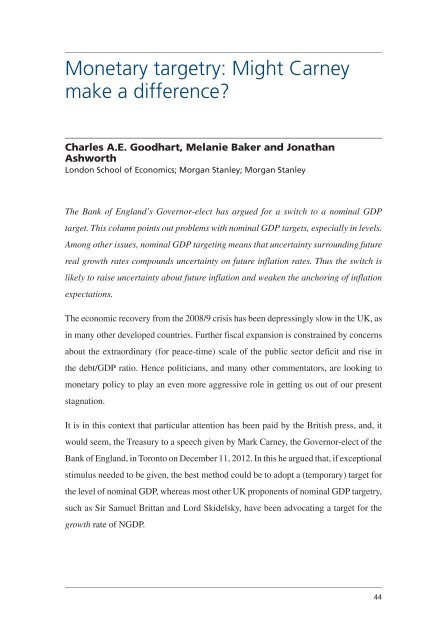Is <strong>inflation</strong> <strong>targeting</strong> passé?Frankel, Jeffrey (2012), “The death of <strong>inflation</strong> <strong>targeting</strong>”, VoxEU.org, 19 June.Goodhart, Charles, A E, Melanie Baker, and Jonathan Ashworth (2013), “Monetarytargetry: Might Carney make a difference?”, VoxEU.org, 22 January.Goodhart, Charles A E (2013), “Central banks asked to walk <strong>inflation</strong>’s razor edge”,Financial Times, 31 January.IMF (2009), “From recession to recovery: how soon and how strong?”, World EconomicOutlook, Chapter 3, April.Mishkin, Fredric S (2011), “Monetary policy strategy: lessons from the crisis”, NBERworking paper 16755, February.About the authorStefan Gerlach was appointed Deputy Governor (Central Banking) in September,2011. Prior to joining the Bank, he served as Professor of Monetary Economics andManaging Director of the Institute for Monetary and Financial Stability at the Universityof Frankfurt and a CEPR Research Fellow. He has served as Head of Secretariat to theCommittee on the Global Financial System at the Bank for International Settlements(BIS), as Executive Director (Research) at the Hong Kong Monetary Authority andDirector of the Hong Kong Institute for Monetary Research. Before joining the HongKong Monetary Authority, he was a staff economist at the BIS.43
Monetary targetry: Might Carneymake a difference?Charles A.E. Goodhart, Melanie Baker and JonathanAshworthLondon School of Economics; Morgan Stanley; Morgan StanleyThe Bank of England’s Governor-elect has argued for a switch to a nominal GDPtarget. This column points out problems with nominal GDP targets, especially in levels.Among other issues, nominal GDP <strong>targeting</strong> means that uncertainty surrounding futurereal growth rates compounds uncertainty on future <strong>inflation</strong> rates. Thus the switch islikely to raise uncertainty about future <strong>inflation</strong> and weaken the anchoring of <strong>inflation</strong>expectations.The economic recovery from the 2008/9 crisis has been depressingly slow in the UK, asin many other developed countries. Further fiscal expansion is constrained by concernsabout the extraordinary (for peace-time) scale of the public sector deficit and rise inthe debt/GDP ratio. Hence politicians, and many other commentators, are looking tomonetary policy to play an even more aggressive role in getting us out of our presentstagnation.It is in this context that particular attention has been paid by the British press, and, itwould seem, the Treasury to a speech given by Mark Carney, the Governor-elect of theBank of England, in Toronto on December 11, 2012. In this he argued that, if exceptionalstimulus needed to be given, the best method could be to adopt a (temporary) target forthe level of nominal GDP, whereas most other UK proponents of nominal GDP targetry,such as Sir Samuel Brittan and Lord Skidelsky, have been advocating a target for thegrowth rate of NGDP.44
- Page 5 and 6: Centre for Economic Policy Research
- Page 8 and 9: ForewordSince the onset of the Glob
- Page 11 and 12: IntroductionLucrezia Reichlin and R
- Page 13 and 14: Is inflation targeting dead? Centra
- Page 15 and 16: Is inflation targeting dead? Centra
- Page 17 and 18: Is inflation targeting dead? Centra
- Page 19 and 20: Is inflation targeting dead? Centra
- Page 21 and 22: Is inflation targeting dead? Centra
- Page 23 and 24: Is inflation targeting dead? Centra
- Page 25 and 26: Is inflation targeting dead? Centra
- Page 27 and 28: Is inflation targeting dead? Centra
- Page 29 and 30: Is inflation targeting dead? Centra
- Page 31 and 32: Is inflation targeting dead? Centra
- Page 33 and 34: Is inflation targeting dead? Centra
- Page 35 and 36: Is inflation targeting dead? Centra
- Page 37 and 38: Is inflation targeting dead? Centra
- Page 39 and 40: Is inflation targeting dead? Centra
- Page 41: Is inflation targeting dead? Centra
- Page 46 and 47: Monetary targetry: Might Carney mak
- Page 48 and 49: Monetary targetry: Might Carney mak
- Page 50 and 51: Monetary targetry: Might Carney mak
- Page 52 and 53: Is inflation targeting dead?Ben Bro
- Page 54 and 55: Is inflation targeting dead?to rais
- Page 56 and 57: Is inflation targeting dead?to ‘l
- Page 58 and 59: Is inflation targeting dead?The cos
- Page 60 and 61: Cheap talk is no alternative toinfl
- Page 62 and 63: Cheap talk is no alternative to inf
- Page 64 and 65: Cheap talk is no alternative to inf
- Page 66 and 67: Cheap talk is no alternative to inf
- Page 68 and 69: The evolution of modern central ban
- Page 70 and 71: The evolution of modern central ban
- Page 72 and 73: The evolution of modern central ban
- Page 74 and 75: The evolution of modern central ban
- Page 76 and 77: Inflation targeting: Fix it, don’
- Page 78 and 79: Inflation targeting: Fix it, don’
- Page 80 and 81: Inflation targeting: Fix it, don’
- Page 82 and 83: Inflation targeting: Fix it, don’
- Page 84 and 85: Inflation targeting: Fix it, don’
- Page 86 and 87: Inflation targeting: Fix it, don’
- Page 88 and 89: Inflation targeting: Fix it, don’
- Page 90 and 91: Inflation targeting: Fix it, don’
- Page 92 and 93: Nominal-GDP targets, without losing
- Page 94 and 95:
Nominal-GDP targets, without losing
- Page 96 and 97:
Reviving ‘money and banking’Mar
- Page 98 and 99:
Reviving ‘money and banking’col
- Page 100 and 101:
Reviving ‘money and banking’Thi
- Page 102 and 103:
Reviving ‘money and banking’pro
- Page 104 and 105:
Reviving ‘money and banking’200
- Page 106 and 107:
A broader mandate: Why inflation ta
- Page 108 and 109:
A broader mandate: Why inflation ta
- Page 110 and 111:
A broader mandate: Why inflation ta
- Page 112 and 113:
A broader mandate: Why inflation ta
- Page 114 and 115:
Flexible inflation targeting:Perfor
- Page 116 and 117:
Flexible inflation targeting: Perfo
- Page 118 and 119:
Flexible inflation targeting: Perfo
- Page 120 and 121:
Flexible inflation targeting: Perfo
- Page 122 and 123:
Will central banking change?allowed
- Page 124 and 125:
Will central banking change?unemplo
- Page 126 and 127:
Will central banking change?About t
- Page 128 and 129:
Central banking after the crisis: C
- Page 130 and 131:
Central banking after the crisis: C
- Page 132 and 133:
Central banking after the crisis: C
- Page 135 and 136:
Challenges to inflation targetingaf
- Page 137 and 138:
Is inflation targeting dead? Centra
- Page 139 and 140:
Is inflation targeting dead? Centra
- Page 141:
Fourteen world-renowned scholars, p



